Buy Modular Kitchen Designs
Introduction
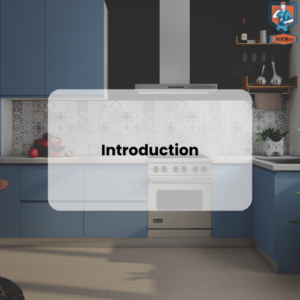
Welcome to NX Interior – your ultimate guide to transforming your kitchen into a functional and stylish space. In this comprehensive article, we will explore the concept of how to buy modular kitchen designs, their advantages, and key features, and provide essential tips for choosing, maintaining, and avoiding common mistakes.
Whether you’re a homeowner or an interior design enthusiast, this article will equip you with the knowledge to make informed decisions and create a modular kitchen that suits your needs and preferences.
What are Modular Kitchen Designs?
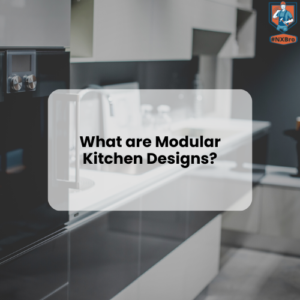
Modular kitchen designs are a contemporary approach to kitchen layouts, characterized by a pre-designed structure consisting of modular units or modules.
These modules can be customized and arranged according to the available space, ensuring optimal utilization and efficient workflow within the kitchen. The flexibility offered by modular designs allows homeowners to personalize their kitchens while enjoying the convenience of pre-fabricated units.
Advantages of Modular Kitchen Designs
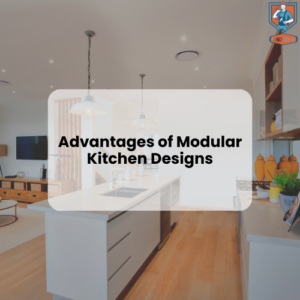
Modular kitchen designs offer numerous advantages over traditional kitchen layouts. Here are some key benefits:
- Flexibility: Modular kitchens provide flexibility in terms of layout and customization. You can choose from a variety of modules, such as cabinets, drawers, shelves, and countertops, and arrange them to suit your specific requirements.
- Space Optimization: With modular designs, you can make the most of limited space. The efficient use of cabinets, pull-out shelves, and tall units ensures ample storage, even in compact kitchens.
- Easy Installation: Modular kitchens are designed for quick and hassle-free installation. The prefabricated units are manufactured off-site and can be easily assembled in your kitchen space.
- Style and Aesthetics: These designs offer a wide range of finishes, materials, and color options, allowing you to create a kitchen that matches your style and complements your home decor.
- Functionality: Modular kitchens are designed with functionality in mind. The layout is optimized for ease of movement, efficient storage, and convenient access to utensils, appliances, and ingredients.
Key Features of Modular Kitchen Designs
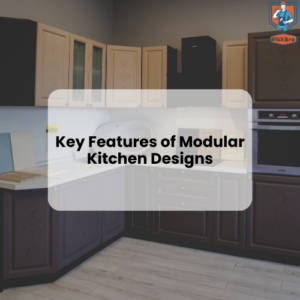
When exploring modular kitchen designs, it’s essential to understand the key features that contribute to their functionality and appeal. Here are some prominent features to consider:
1. Cabinets and Storage Solutions
Modular kitchens offer a variety of cabinet options, including overhead cabinets, base cabinets, corner units, and tall units. These cabinets provide ample storage space for utensils, cookware, and groceries. Additionally, specialized storage solutions like pull-out drawers, carousel units, and plate racks enhance accessibility and organization.
2. Countertops and Workspaces
The countertop is a crucial element in any kitchen. Modular kitchen designs offer a range of materials such as granite, quartz, or solid surface, each with its unique aesthetic and practical advantages. These countertops provide spacious and durable work surfaces for meal preparation and cooking.
3. Appliances Integration
Modular kitchen designs incorporate seamless integration of appliances, such as built-in ovens, cooktops, refrigerators, and dishwashers. These integrated appliances maintain a streamlined look while maximizing functionality.
4. Lighting and Ventilation
Effective lighting and ventilation are vital for a functional kitchen. Modular kitchen designs integrate various lighting options, including ambient lighting, task lighting, and accent lighting, to create an inviting atmosphere. Additionally, well-designed ventilation systems ensure adequate airflow and eliminate cooking odors.
5. Accessories and Decorative Elements
Modular kitchens offer a wide range of accessories and decorative elements to enhance functionality and aesthetics. These include pull-out pantry units, spice racks, waste management systems, and decorative elements like backsplashes and wall panels.
Choosing the Right Modular Kitchen
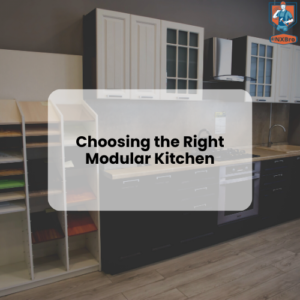
Selecting the perfect modular kitchen for your home requires careful consideration of various factors. Here are some essential tips to guide you:
- Assess Your Needs: Determine your requirements in terms of storage, workspaces, and appliances. Consider your cooking habits, family size, and lifestyle to choose a design that caters to your specific needs.
- Space Planning: Measure your kitchen space accurately and identify any architectural constraints. Optimize the layout by planning the placement of cabinets, appliances, and workstations.
- Material Selection: Choose high-quality materials for cabinets, countertops, and other components. Consider durability, maintenance requirements, and aesthetic appeal when making your selections.
Budget Considerations: Set a budget for your modular kitchen project and explore options within that range. Compare prices, features, and warranties offered by different suppliers to make an informed decision.
Common Mistakes to Avoid

While planning and designing your modular kitchen, it’s essential to be aware of common mistakes that can hinder functionality and visual appeal. Avoid the following pitfalls:
- Insufficient Storage: Inadequate storage can lead to cluttered countertops and inefficient use of available space. Ensure you have enough cabinets and drawers to accommodate your kitchen essentials.
- Poor Ventilation: Inadequate ventilation can result in unpleasant cooking odors, moisture accumulation, and the growth of mold and mildew. Install a reliable ventilation system to maintain a fresh and healthy environment.
- Improper Lighting: Insufficient or poorly planned lighting can make your kitchen appear dim and uninviting. Incorporate a combination of ambient, task, and accent lighting for a well-lit and functional workspace.
- Ignoring Ergonomics: Neglecting ergonomic principles can lead to discomfort and inconvenience while using the kitchen. Ensure the height and placement of countertops, cabinets, and appliances are ergonomically optimized for easy access and efficient workflow.
How to Maintain a Modular Kitchen
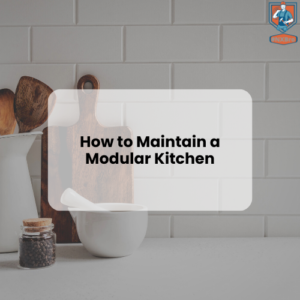
Proper maintenance is essential to preserve the functionality and aesthetics of your modular kitchen. Here are some tips to keep it in pristine condition:
- Regular Cleaning: Clean your modular kitchen regularly to remove grease, food residue, and dust. Use mild cleaning agents and avoid abrasive materials that can damage the finishes.
- Avoid Water Damage: Prevent water damage by wiping spills promptly and ensuring the sink area is adequately sealed. Avoid using excessive water while cleaning cabinets and countertops.
- Handle with Care: Treat the components of your modular kitchen with care. Avoid slamming cabinet doors, use gentle cleaning techniques, and handle appliances following the manufacturer’s instructions.
- Scheduled Maintenance: Schedule periodic maintenance checks for your appliances, plumbing, and electrical systems. This ensures early detection of any issues and extends the lifespan of your kitchen.
The Future of Modular Kitchen Designs
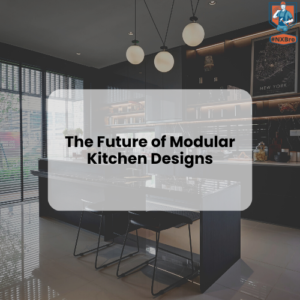
As technology continues to advance, the future of modular kitchen designs holds exciting possibilities. Here are some trends and innovations that we can expect to see in the coming years:
- Smart Integration: Smart home technology is becoming increasingly popular, and modular kitchens are no exception. Expect to see more integration of smart appliances, voice-controlled systems, and IoT (Internet of Things) devices in modular kitchen designs. Imagine controlling your kitchen appliances and lighting through voice commands or smartphone apps for a seamless and convenient cooking experience.
- Sustainable Materials: With the growing emphasis on sustainability and eco-friendly practices, modular kitchens of the future will likely incorporate more sustainable materials. From cabinets made of recycled wood to countertops made from sustainable composite materials, homeowners will have a wide range of environmentally friendly options to choose from.
- Innovative Storage Solutions: As storage needs continue to evolve, modular kitchen designs will incorporate even more innovative storage solutions. Expect to see modular units with built-in storage compartments, hidden drawers, and cleverly designed pull-out systems to maximize storage space and keep the kitchen organized.
- Customization and Personalization: Personalization will play a significant role in the future of modular kitchen designs. From customizable modules and finishes to personalized layouts tailored to individual preferences, homeowners can create a kitchen that truly reflects their unique style and needs.
- Integration of Multi-Functional Spaces: The concept of open floor plans and multi-functional spaces is gaining popularity in modern homes. In the future, modular kitchen designs will seamlessly integrate with other living spaces, allowing for a smooth transition between cooking, dining, and entertaining areas. Modular units with multifunctional features, such as extendable countertops and convertible dining tables, will become more common.
- Virtual Reality (VR) and Augmented Reality (AR) Experiences: Virtual reality and augmented reality technologies are revolutionizing various industries, and the kitchen design industry is no exception. In the future, homeowners may be able to visualize and customize their modular kitchen designs using VR and AR tools, providing a highly immersive and interactive experience before making any decisions.
- Enhanced Durability and Longevity: Modular kitchens of the future will focus on durability and longevity. Manufacturers will continue to improve the quality of materials and construction techniques to ensure that modular kitchens withstand the test of time and daily use.
Embracing Innovation: The Latest Trends in Modular Kitchen Designs
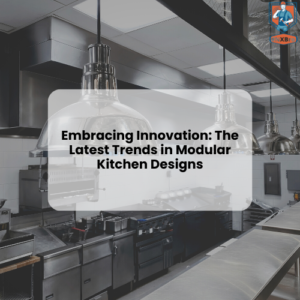
Modular kitchen designs continue to evolve, driven by innovation and changing consumer needs. Here are some of the latest trends that are shaping the future of modular kitchens:
- Minimalist Aesthetics: The minimalist trend is gaining momentum in kitchen design, and modular kitchens are no exception. Clean lines, sleek finishes, and clutter-free spaces are becoming increasingly popular. Minimalist modular kitchens focus on functionality and simplicity, with hidden storage solutions and seamless integration of appliances.
- Bold Colors and Contrasts: While minimalism remains popular, there is also a growing trend toward using bold colors and contrasting elements in modular kitchen designs. Vibrant hues like deep blues, emerald greens, and rich yellows are being used to create focal points and add personality to the kitchen space. Contrasting materials, such as combining wood and metal, or matte and glossy finishes, are also being embraced for added visual interest.
- Open Shelving and Display Units: Open shelving and display units are becoming more prevalent in modular kitchen designs, allowing homeowners to showcase their favorite kitchenware and decorative items. This trend adds a touch of personalization and creates a visually appealing focal point within the kitchen.
- Integration of Natural Elements: Bringing nature indoors is a trend that continues to flourish in kitchen design. Modular kitchens incorporate natural elements such as stone countertops, wooden accents, and indoor plants to create a sense of warmth and tranquility. These natural elements add texture and a connection to the outdoors, creating a refreshing ambiance in the kitchen.
- Multi-Level Islands: Kitchen islands have always been a popular feature in modular kitchen designs, but the trend is shifting towards multi-level islands. These islands provide various work surfaces at different heights, allowing for efficient meal preparation, dining, and even entertaining. Multi-level islands also add visual interest and architectural flair to the kitchen space.
- Smart Storage Solutions: With the increasing demand for efficient storage, modular kitchen designs incorporate innovative storage solutions. From pull-out pantries and corner units to modular drawer systems and custom-designed organizers, these smart storage solutions maximize space and make it easier to keep the kitchen organized.
- Integration of Technology: Technology is revolutionizing the way we live, and modular kitchens are embracing this trend. From smart appliances with built-in touchscreens and connectivity features to automated lighting and voice-controlled systems, technology is seamlessly integrated into modern modular kitchen designs, enhancing convenience and functionality.
Frequently Asked Questions
Q1: Are modular kitchens suitable for small spaces?
Yes, modular kitchens are an excellent choice for small spaces. Their customizable nature allows for efficient utilization of every inch of available space.
Q2: Can I add or modify modules in my modular kitchen later?
Yes, one of the key advantages of modular kitchens is their flexibility. You can add or modify modules as per your changing needs and preferences.
Q3: How long does it take to install a modular kitchen?
The installation time depends on various factors, such as the complexity of the design and the size of the kitchen. However, on average, installation can be completed within a few days to a couple of weeks.
Q4: What materials are commonly used for modular kitchen cabinets?
Commonly used materials for modular kitchen cabinets include wood, medium-density fiberboard (MDF), and high-density fiberboard (HDF). Each material has its unique characteristics and price points.
Q5: Are modular kitchens more expensive than traditional kitchens?
Modular kitchens can vary in price depending on the design, materials, and customization options. While they may be more expensive initially, their long-term benefits, such as durability and functionality, make them a worthwhile investment.
Conclusion
In conclusion, We provided a comprehensive guide to understanding, choosing, and maintaining modular kitchen designs. With their flexibility, space optimization, and functional features, modular kitchens are an excellent choice for homeowners looking to modernize their kitchens.
By avoiding common mistakes and following the tips outlined in this article, you can create a modular kitchen that meets your needs, reflects your style, and enhances the overall functionality and appeal of your home.